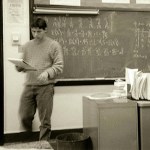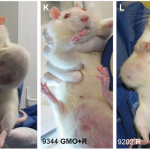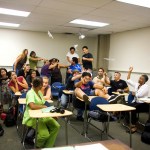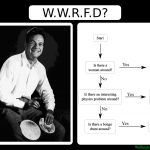education
What with the umpteen zillion articles declaring the Death of the Blog, I've been toying with the idea of doing something podcast-ish for a while. Rhett Allain from Dot Physics was game, too, and suggested using Google+ to do a video hangout, so here we are talking about our classes this term:
The video quality is kind of crap on my end, which is a recurring problem here when we Skype with the grandparents. I probably should've closed more programs and tabs, but I'm an idiot. Also, I fidget a lot. But this is meant to be fairly casual, and I really do talk with my hands like that.
Anyway,…
It’s probably my earliest public health memory — the image of Surgeon General C. Everett Koop and his grandfatherly beard on the television warning my elementary school self about the dangers of smoking. He was the first doctor I knew by name.
But while Koop may be the surgeon general that people of my generation most likely associate with the public health movement to reduce smoking, he wasn’t the first to speak out against tobacco. Koop was carrying on a legacy that began decades before with the nation’s ninth surgeon general, Luther Terry, who on Jan. 11, 1964, released the first surgeon…
The posts on box-checking and liberal arts teaching generated a fair number of comments that I haven't really had time to address individually, across a few different social media platforms. So I'm going to collect some of the more important stuff here, in one catch-up post.
--A few people, mostly in places that aren't conducive to linking, raised versions of "You never know what will be useful" as a justification for having a list of boxes to check. And I don't entirely disagree with that. I'm not against the idea of forcing students to take a broader range of stuff than they otherwise might…
As a follow-up to yesterday's post about liberal education and the failure modes thereof, I thought I should try to do something constructive and make suggestions regarding how you might go about a "poetry for physicists" kind of thing. After all, one of the things I find intensely frustrating about a lot of "crisis in ____" discussions is the lack of specific suggestions, so throwing out a "here's a problem, good luck with that" post would be suboptimal behavior on my part. This required some reflection on the question of just what I got out of my "liberal arts" classes back in the day--…
With so much pressure on the Affordable Care Act to immediately live up to high expectations, and with opponents who seem gleeful at the news that Americans are having a hard time signing up for affordable health care, it’s reassuring to read that the health reform law can readily take a few blows and keep moving forward.
In a December analysis released by the Urban Institute, authors Linda Blumberg and John Holahan write that the “Affordable Care Act is unlikely to suffer long-term damage even if the marketplaces experience low enrollment and some adverse selection in the first year.” (…
One of the many ancillary tasks associated with my job that I wish I was better at is the advising of students. More specifically, the advising of students who aren't like I was at that age.
What I mean by that is that when I was a student, I didn't need to be convinced of the utility of liberal arts education. I had specifically chosen to go to williams in part because of the small size (having grown up in a small town, I found it more congenial), but also because I was never only interested in science. I always enjoyed reading books and discussing history and politics, so I didn't need a…
I'm teaching introductory E&M this term, so it's kind of fun to play around with silly applications of Coulomb's Law. For example, let's imagine that gravity suddenly switched off, but we wanted to keep the Earth in its orbit. How much charge would we need to move from the Earth to the Sun for the electrostatic attraction to take the place of gravity?
The key here is to set the gravitational force, which we can reasonably approximate by Newton's Law of Universal Gravitation:
$latex F_{grav}=G\frac{M_1 m_2}{R^2} $
(where the M's are the masses, R is the distance between them, and G is a…
Classes for the Winter term start today, and I'm totally prepared for this. Yep. Uh-huh. Losing a bunch of prep time to snow and ice last week hasn't thrown anything into disarray.
Anyway, for a variety of reasons, I've ended up departing from my plan to not do any new preps while I'm stuck being Chair, and I'll be teaching intro E&M this term. This isn't a completely new class, but the last time I taught it I was very much in traditional lecture mode, and this will be my first pass using more of an active learning approach. Which will mean a lot of time re-working slides and that sort of…
On EvolutionBlog, Jason Rosenhouse confronts the challenge of basic math education: “we need to find a balance between hammering the basic skills, while also making it clear that there is so much more to mathematics than arithmetic.” Rosenhouse rejects the approach of New Math, “teaching grade-schoolers about set theory and the axiomatic method,” instituted briefly in the U.S. after the Soviets launched a giant ball bearing named Sputnik into orbit. Rosenhouse goes on to question whether teachers should emphasize experimental mathematics, wherein the brute…
Only a couple days left to get Monty Harpers next science-songs-for-kids album funded!
In case I have not made this clear in the past, I really appreciate Montys approach to exposing kids to science.
He does not dumb things down. He demands that the scientists he works with do *not* dumb down their science 'for kids'. When I worked with him for a program at the Stillwater Public Library, this approach did not lead to confused, bored kids-- It lead to really freaking great questions from kids.
And kids need to be exposed to *real science*. Not Erlenmeyer flasks of bubbling green liquid '…
“Who is more humble? The scientist who looks at the universe with an open mind and accepts whatever the universe has to teach us, or somebody who says everything in this book must be considered the literal truth and never mind the fallibility of all the human beings involved?” -Carl Sagan
It's a challenging thing, to admit to ourselves how vast and mysterious this Universe is, and how small and ignorant we all truly are. It can feel daunting and isolating to think about it, and solace can be difficult to find, as Mazzy Star can maybe help you related to as you listen to their wonderful song…
WHOO!
FREE book on GMOs, written by actual scientists and farmers, compiled by a former anti-GMOer who is now convinced of GMOs utility:
The Lowdown on GMOs: According to Science
I found out about this book from two of my friends, Karl Haro von Mogel and Anastasia Bodnar. These two were part of founding Biofortified (The Pandas Thumb of plant genetics) and are actual scientists (not just random people on the internet with an opinion).
But you can learn more about the other authors from David Tribe (another actual scientist and contributor to the book).…
Hey guys!
Monty Harper is trying to raise funds to do ANOTHER 'Songs from the Science Frontier'!
Not only does he have some great rewards for donations (for $15, you get the songs, totally reasonable), he has got a bunch of new donation bonuses up for Cyber Monday, like including your kids voice in one of the songs for a $100 donation!
Volume I is super fun, and I really hope he makes the Kickstarter deadline for a Volume II!
I dont know about you all, but I love those infographic things people create. They make statistics a lot more understandable and relatable than a chart of black-and-white numbers. Here is a cool one that turns devastating diseases into really pretty graphics ;)
An infographic by the team at Online Masters In Public Health
It takes time to change social norms, so it'll probably take many, many years until it's as socially unacceptable to text or use a cell phone while driving as it is to start the engine without first buckling a seat belt. In the meantime, researchers say, smart policies are needed to address the increasing share of pedestrian and bicyclist deaths attributed to distracted driving.
According to a new study published in Public Health Reports, the rate of distracted driving-related fatalities per 10 billion vehicle miles traveled went up from 116.1 in 2005 to 168.6 in 2010 for pedestrians and from…
Can we replace Classroom Chaos with Learning-Centered Education?
K–12 education can be better. One of the most effective changes that could be made is to reduce the amount of chaos in the classroom and replace it with learning.
I spend several hours a year in various schools giving presentations on Anthropology, Evolution, Brainzz, and other topics. Plus, I know some teachers and have taught seminars specifically for teachers. For these reasons I have a sense of what happens in high school (and to a lesser extent middle school and elementary school) classrooms. What I am about to describe…
"Bad men need nothing more to compass their ends, than that good men should look on and do nothing." -John Stuart Mill
No one becomes a master overnight, and practically no one does it without the outside help and support of not just a mentor, but of a number of peers, advisors and other allies along the way. At least, that was my story.
Image credit: University of Baltimore.
I remember being an undergraduate. I remember the combined struggles of rigorous academics, self-confidence crises, trying to figure myself out as a person, and trying to make friends and forge relationships…
A new study finds that dropping out of high school greatly increases the risk of illness and disability in young adulthood. It's another example of why education is one of the greatest social determinants of health and a key leverage point in improving health across the lifespan.
Published earlier this month in the journal BMC Public Health, researchers found that dropping out of high school was associated with later illness and disability even after adjusting for other factors, such as family socioeconomic status, health-related risk behaviors, psychosocial risk factors and school problems.…
Back in July, Physics Today ran an article on Reinventing physics for life-sciences majors (I couldn't find an un-paywalled version, but this arxiv preprint seems to be close to it). As I've had some bad experiences with that class, I flagged it as something to read, but only got around to it last night. The main idea is that a "Physics for Life Sciences" course needs to be arranged around the way biologists think, which is fundamentally different than the way physicists think:
In general, physicists stress reasoning from a few fundamental principles—usually mathematically formulated—and seek…
Strategies to reduce the deathly toll of prescription drug abuse are reaping positive outcomes, though not every state is taking full advantage, according to a new report from Trust for America's Health.
Released earlier this week, "Prescription Drug Abuse: Strategies to Stop the Epidemic" found that 28 states and Washington, D.C., scored six or less out of 10 possible indicators of "promising strategies" to address prescription drug abuse, which has contributed to a startling rise in overdose deaths. Since 1999, such deaths have doubled in 29 states, four of which experienced a quadrupling…



